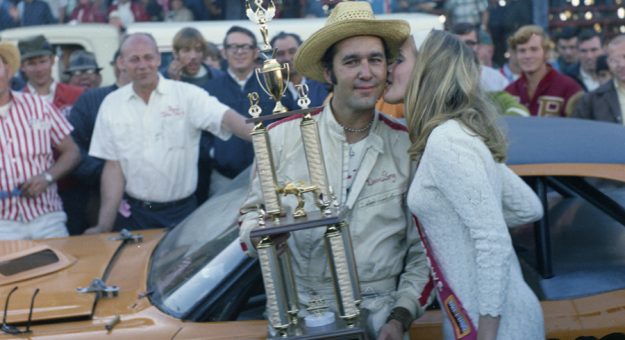INDIANAPOLIS — The Winchester 400 has a birthday this year, a milestone worthy of celebration.
It’s the 50th running of the stock car classic on the high banks of Indiana’s Winchester Speedway, an event that was instrumental in the birth of modern short-track, stock car racing.
For those of us who have experienced the “400 weekend,” there is something special about the Winchester 400. What is especially interesting is that the magic was present from day one.
When the first race was run in 1970, the concept of drawing regional racers to a big track for a long, high-paying race was just a theory. “These guys don’t travel,” skeptics insisted. But several key players had the determination and vision to make it work.
Autumn 1970: A seminal moment in short-track racing history.
Rex Robbins was an aspiring promoter and undying advocate of racing. He was searching for a formula that could attract racers, fans and media attention and thereby grow the sport. His early efforts involved sprint cars at Anderson Speedway (then Sun Valley Speedway), but Robbins soon sensed stock car events could draw more cars and fans.
Roger Holdeman was the new owner of Winchester Speedway, a headstrong man who purchased the historic venue in May 1970 just as it seemed the track’s luster had begun to dull. Determined to make it work, Holdeman faced a $3,500 balloon payment at the end of the 1970 season that was a make-or-break proposition.
Ed Friddle — “Big Ed” — was a local entrepreneur with a passion for racing who a few years earlier served as crew chief on the ARCA team fielded by Robbins. Friddle dreamed of a major stock car event that could bring together drivers from throughout the Midwest for a “showdown.” But he needed a track and partners.
Friddle approached Robbins about a 500-lap stock car race at Winchester. Robbins laughed; Winchester is a sprint car track, he insisted. “You ought to try Dayton Speedway,” he suggested.
Undeterred, Friddle pressed Robbins on the topic. A “natural born salesman,” according to Robbins, Friddle finally convinced Robbins that the idea had potential.
But what about Holdeman? Would he go for the idea? A few months earlier he scoffed when Robbins suggested they try some stock car races on the historic high-banked half-mile.
“I don’t want anything to do with those damned stock cars,” Holdeman insisted. As a compromise, Robbins convinced Holdeman to partner with him for a couple of stock car races in August and September 1970, with Robbins getting the gate money and Holdeman the concessions.
The events were successful, but not by a runaway. Still, Holdeman took note and softened his position. Maybe that balloon payment coming due in a few months was in the back of his mind.
With urging from Robbins, Holdeman agreed to try a major stock car race on Sunday, Oct. 4. At the insistence of Robbins, they compromised and set the race length at 400 laps. Friddle, who had a traveling sales route representing various automotive products, talked Dri-Powr — an oil additive — into throwing some money their way as sponsorship.
The Dri-Powr 400 was real.
History smiled upon the three men — and really, the entire sport — when a big crowd ignored the chilly morning temperatures that October day and flocked to Winchester. The 400 was a success by every measure, and everyone — racers, fans, media people, even the race officials — left the track that evening on a tidal wave of enthusiasm.
Fort Wayne’s Dave Sorg was the winner and it’s unlikely anyone could have realized in the moment that history was being defined, right before their eyes.
Robbins used the event as a stepping-stone to launching the American Speed Ass’n, one of the most successful and influential racing series in history. Friddle built a thriving business — Car Brite — that prospered for many years. Holdeman cleared more than $7,000 on that fateful Sunday, covering the balloon payment and keeping Winchester Speedway alive and well.
Robbins, Holdeman and Friddle have all left us, unfortunately. But there is no doubt that when the 50th running of the Lucas Oil Winchester 400 presented by JEGS gets underway on Sunday, Oct. 17, three smiling pioneers will be looking down upon the scene, proud their dream still creates a tidal wave of enthusiasm.
